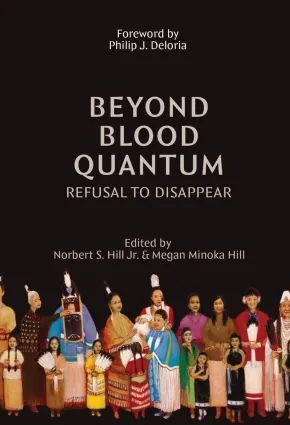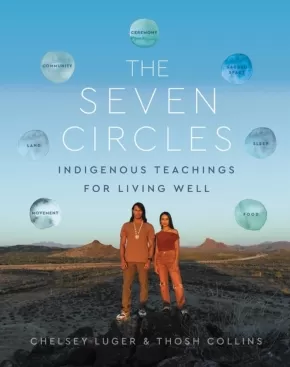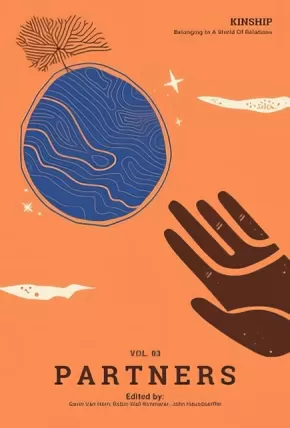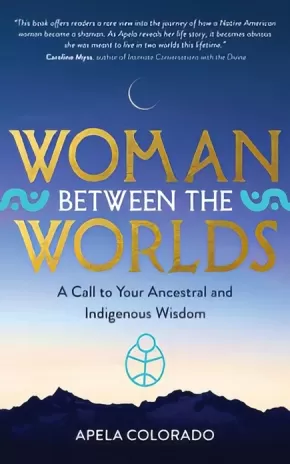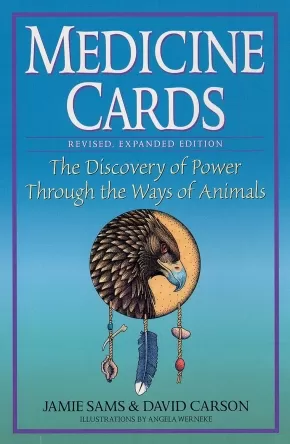
Haudenosaunee (Iroquois)
1
-
7
of
7 Results;
Sort By
Beyond Blood Quantum: Refusal to Disappear
$33.95
Format:
Paperback
Text Content Territories:
Indigenous American;
Reading Level: N/A
ISBN / Barcode: 9781682754627
Synopsis:
Synopsis:
In Beyond Blood Quantum, voices from Indian Country convey the insidious impacts of the Indian Reorganization Act confronting the existential and pragmatic questions facing many Native Nations to determine who is—and who is not—a citizen. The voices of poets, parents, academics, activists, educators, young adults, and elders prompt conversations in consideration of shared cultural values and lived realities outside of the limited confines of blood quantum.
Both informational and poetic, Beyond Blood Quantum: Refusal to Disappear is a guide for conversation in-community and a songline of voices grappling with contemporary Native identity and the sovereignty inherent in defining citizenship with analysis softened by appreciation for kin, land, and promises to future generations from the descendants of generations who continue to resist, who refuse to disappear.
Reviews
“The tough issues of Native American identity come from within our communities as well as the harmful legacy of oppressive federal Indian policy. From the rise in “pretendians” to the fetishization of Native culture, contributors allow readers to explore the complexities of what it means to belong to a Tribe/Native Nation, according to their own customs and governance." —Karen Diver, Senior Advisor to the President for Native American Affairs at the University of Minnesota, Former Chairwoman, Fond du Lac Band of Lake Superior Chippewa, and Former Special Assistant to President Obama for Native American Affairs
"Our elders teach us that no man, or government, not even the most powerful nation in the world can take away all that defines who we are as Indigenous people—that the Creator gifted to our foremothers and forefathers at the time of Creation—but ourselves. They say that if we are not mindful of our past experiences of our foremothers and forefathers surviving every conceivable policy and laws imposed upon our people, generation after generation, we can at some point in our journey be capable of becoming our own worst enemy. When we internalize the oppression as exhibited by this nation upon our people, and internalize that oppression, we can become the oppressors. The elders warn and prophesied that when that happens, it will be the beginning of the end of us. It is deviating from our core values as gifted to us by our Creator as the deepest expression of love for us. Blood quantum is the epitome of this departure from the Original Instructions of embracing all sacred beings that our children represent so that our lifeways will continue and thrive. The elders say, they are the sacred beings, gifts from the Creator so that we shall continue as a People. The use of blood, our lifeline, to define our relations and our connections ironically in this time of self determination could be the cause of our end. What the government designed, we shall complete. This cannot be the end of our journey.” —Regis Pecos
“A testament to the refusal to disappear and inherent Indigenous sovereignty, Beyond Blood Quantum offers profound insights and reflections on the path forward.” —Wayne Ducheneaux
“Tribal citizens must become informed of where we are and where we are going on the explosive issue of blood quantum. The chapters in this book are a tool for self-education and constitute possible road maps for the future of Indian nations.”—Henrietta Mann
“Blood quantum is an issue that all tribes need to be aware of as they exercise their sovereign right to set their membership standards.” —John Echohawk
Additional Information
288 pages | 6.00" x 9.00" | Paperback
Old School Indian: A Novel
$36.99
Format:
Hardcover
Reading Level: N/A
ISBN / Barcode: 9781638931454
Synopsis:
Synopsis:
A coming-of-middle-age novel about an Ahkwesáhsne man’s reluctant return home and what it takes to heal.
Abe Jacobs is Kanien’kehá:ka from Ahkwesáhsne—or, as white people say, a Mohawk Indian from the Saint Regis Tribe. At eighteen, Abe left the reservation where he was raised and never looked back.
Now forty-three, Abe is suffering from a rare disease—one his doctors in Miami believe will kill him. Running from his diagnosis and a failing marriage, Abe returns to the Rez, where he’s persuaded to undergo a healing at the hands of his Great Uncle Budge. But Budge—a wry, recovered alcoholic prone to wearing punk T-shirts—isn’t all that convincing. And Abe’s time off the Rez has made him a thorough skeptic.
To heal, Abe will undertake a revelatory journey, confronting the parts of himself he’s hidden ever since he left home and learning to cultivate hope, even at his darkest hour.
Delivered with crackling wit, Old School Indian is a striking exploration of the power and secrets of family, the capacity for healing and catharsis, and the ripple effects of history and culture.
Reviews
“With amazing dexterity, Aaron John Curtis’s moving debut novel, Old School Indian, combines raucous humor with respect for ancestral traditions, revealing that home is not only where a heart resides. Home is a place in our spirits, in our histories, in our memories—home is a longing that never leaves us.” —Honorée Fanonne Jeffers, New York Times bestselling author of The Love Songs of W.E.B. Du Bois
“Old School Indian is an inspired novel by an author whose voice absolutely sizzles on the page. Aaron John Curtis has given us a moving story of self-discovery that journeys through the crucibles of sickness, history, identity, family, and loss—all told by one of the most inventive, funny, brash narrators you’ll ever find. A beautiful, dazzling debut.” ―Nathan Hill, New York Times bestselling author of Wellness and The Nix
“With its profound exploration of identity, language, and cultural survival, Old School Indian commands attention. Through the vivid and deeply human lives of a Mohawk family, Curtis weaves a narrative that insists we listen closely and engage deeply. The characters, grounded in both tradition and the challenges of modernity, speak with a voice that is both urgent and timeless, drawing us into a world where every word, every action, carries the weight of history and the hope for the future. Curtis strikingly balances humor and gravity, creating a story that forces us to confront our assumptions, demands to be heard, and ultimately reminds us of the enduring, sacred power of storytelling. Old School Indian joins the ranks of the finest fiction written by Indigenous peoples, past and present. This is a novel of pure heart and mastery.” ―Morgan Talty, national bestselling author of Night of the Living Rez and Fire Exit
“Aaron John Curtis's audacious debut is not just a novel. It is personal and collective history dancing on the page to wake us to the world around us. By examining the colonization of a body and a people, Old School Indian addresses our festering wound of a need to heal, challenging us to use memory as a remedy and our purpose as a cure. You'll laugh, you'll think, you may even shed a few tears and sit in wonder at the ingenuity and sheer balls of this work and author. An instant classic that will continue to beat in readers' hearts for generations.” —Mateo Askaripour, New York Times bestselling author of Black Buck and This Great Hemisphere
“Aaron John Curtis gives us honest storytelling shaped by humor, sincerity, and heartbreak. His characters are drawn with strength from his Indigenous community and skillfully cured by tradition and hope. Old School Indian is a novel that reminds us of an essential truth: When one person heals, the entire community can feel it.”—Oscar Hokeah, PEN/Hemingway Award-winning author of Calling for a Blanket Dance
“This is my favorite kind of storytelling: chock-full of humor and grief, packed with intriguing family lore, and written with a tremendous amount of heart. Aaron John Curtis has crafted something powerfully complex here; a novel that invites you to sit down, take a beat, and share space. This book is a feast for the senses—it’s an incredible meal you’ll want to share with your friends. Old School Indian is exceptional.” —Kristen Arnett, New York Times bestselling author of Mostly Dead Things
“Curtis’ debut novel holds the power to open eyes to who Indigenous people truly are. Brave, funny and irreverent, Old School Indian reveals what separates us from each other—but also from ourselves. As Abe endures the painful internalized racism that comes from filtering who he is through what the world says about him, his journey indicts all the relationships that ask us to filter who we are through narratives of oppression. And at its heart, this is a story about what it means to practice care.” —Chelsea T. Hicks, author of A Calm and Normal Heart and National Book Foundation 5 Under 35 Honoree
“An affecting tale of loss and healing that thrives through its seriocomic style.” —Kirkus, starred review
Additional Information
352 pages | 6.00" x 9.00" | Hardcover
The Seven Circles: Indigenous Teachings for Living Well
$36.99
Format:
Hardcover
Text Content Territories:
Indigenous American; Native American; Sioux; Pima (Akimel O'odham); Osage; Haudenosaunee (Iroquois); Seneca; Cayuga; Anishinaabeg; Ojibwe (Chippewa); Turtle Mountain Anishinaabe;
Grade Levels: 12; University/College;
ISBN / Barcode: 9780063119208
Synopsis:
Synopsis:
In this revolutionary self-help guide, two beloved Native American wellness activists offer wisdom for achieving spiritual, physical, and emotional wellbeing rooted in Indigenous ancestral knowledge.
When wellness teachers and husband-wife duo Chelsey Luger and Thosh Collins founded their Indigenous wellness initiative, Well for Culture, they extended an invitation to all to honor their whole self through Native wellness philosophies and practices. In reclaiming this ancient wisdom for health and wellbeing—drawing from traditions spanning multiple tribes—they developed the Seven Circles, a holistic model for modern living rooted in timeless teachings from their ancestors. Luger and Collins have introduced this universally adaptable template for living well to Ivy league universities and corporations like Nike, Adidas, and Google, and now make it available to everyone in this wise guide.
The Seven Circles model comprises interconnected circles that keep all aspects of our lives in balance, functioning in harmony with one another. They are:
- Food
- Movement
- Sleep
- Ceremony
- Sacred Space
- Land
- Community
In The Seven Circles, Luger and Collins share intimate stories from their life journeys growing up in tribal communities, from the Indigenous tradition of staying active and spiritually centered through running and dance, to the universal Indigenous emphasis on a light-filled, minimalist home to create sacred space. Along the way, Luger and Collins invite readers to both adapt these teachings to their lives as well as do so without appropriating and erasing the original context, representing a critical new ethos for the wellness space. Each chapter closes with practical advice on how to engage with the teachings, as well as wisdom for keeping that particular circle in harmony with the others.
With warmth and generosity—and 75 atmospheric photographs by Collins throughout—The Seven Circles teaches us how to connect with nature, with our community, and with ourselves, and to integrate ancient Indigenous philosophies of health and wellbeing into our own lives to find healing and balance.
Reviews
“A life-changing holistic guide to wellness rooted in empowerment, resiliency, and ‘good medicine.’ This book is for any human being searching for wellness solutions in a chaotic world, a true antidote to colonization.” — Vina Brown, Indigenous Scholar, Entrepreneur, Artist, and Professor of Indigenous Studies at Northwest Indian College
“The Seven Circles is a true innovation in Indigenous thought; it brings our shared heritage and traditional teachings to life. Truly inspiring. Readers will find their journey to be a motivating guide for self-transformation.” — Taiaiake Alfred, Mohawk Philosopher
“While the term ‘wellness’ has been co-opted and diluted by (primarily white) social media influencers in recent years, Luger and Collins are recentering the conversation around how to use Indigenous cultural values, foods, and modalities of movement as tools for spiritual, mental, physical, and emotional healing.” — Vanity Fair
“[Two of the] faces in the health and wellness scene that are pushing for inclusivity, justice, and kindness, toppling old conventions to make their own…Luger and Collins rewrite modern narratives regarding Native health while addressing complex histories and ongoing disparities.” — Outside magazine
“Spellbinding. This may be the first book I’ve ever read that made me stop and decide, “I’m making this change now!” Seven Circles opened my eyes to a way of life that is tested by time, guided by nature, and urgently needed today." — Christopher McDougall, author of Born to Run, Natural Born Heroes, and Running with Sherman
“Wisdom abounds in this stimulating offering.” — Publishers Weekly
“Luger and Collins provide a range of sensible, informed, accessible guidance for both small- and large-scale lifestyle changes. An appealing manual for healing the self through Indigenous traditions.” — Kirkus Reviews
Additional Information
256 pages | 7.00" x 9.00" | 75 Colour Photos | Hardcover
Kinship: Belonging in a World of Relations, Vol. 3 - Partners
$29.95
Editors:
Format:
Paperback
Text Content Territories:
Indigenous;
Reading Level: N/A
ISBN / Barcode: 9781736862520
Synopsis:
Additional Information
170 pages | 5.27" x 7.75" | Paperback
Synopsis:
Volume 3 of the Kinship series revolves around the question of interspecies relations: How do relations between and among different species foster a sense of responsibility and belonging in us?
We live in an astounding world of relations. We share these ties that bind with our fellow humans—and we share these relations with nonhuman beings as well. From the bacterium swimming in your belly to the trees exhaling the breath you breathe, this community of life is our kin—and, for many cultures around the world, being human is based upon this extended sense of kinship.
Kinship: Belonging in a World of Relations is a lively series that explores our deep interconnections with the living world. The five Kinship volumes—Planet, Place, Partners, Persons, Practice—offer essays, interviews, poetry, and stories of solidarity, highlighting the interdependence that exists between humans and nonhuman beings. More than 70 contributors—including Robin Wall Kimmerer, Richard Powers, David Abram, J. Drew Lanham, and Sharon Blackie—invite readers into cosmologies, narratives, and everyday interactions that embrace a more-than-human world as worthy of our response and responsibility.
How do cultural traditions, narratives, and mythologies shape the ways we relate, or not, to other beings as kin? “Partners,” Volume 3 of the Kinship series, looks to the intimate relationships of respect and reverence we share with nonhuman species. The essayists and poets in this volume explore the stunning diversity of our relations to nonhuman persons—from biologist Merlin Sheldrake’s reflections on microscopic fungal networks, to writer Julian Hoffman’s moving stories about elephant emotions and communication, to Indigenous seed activist Rowen White’s deep care for plant relatives and ancestors. Our relationships to other creatures are not merely important; they make us possible. As poet Brenda Cárdenas, inspired by her cultural connections to the monarch butterfly, notes in this volume: “We are— / one life passing through the prism / of all others, gathering color and song.”
Proceeds from sales of Kinship benefit the nonprofit, non-partisan Center for Humans and Nature, which partners with some of the brightest minds to explore human responsibilities to each other and the more-than-human world. The Center brings together philosophers, ecologists, artists, political scientists, anthropologists, poets and economists, among others, to think creatively about a resilient future for the whole community of life.
We live in an astounding world of relations. We share these ties that bind with our fellow humans—and we share these relations with nonhuman beings as well. From the bacterium swimming in your belly to the trees exhaling the breath you breathe, this community of life is our kin—and, for many cultures around the world, being human is based upon this extended sense of kinship.
Kinship: Belonging in a World of Relations is a lively series that explores our deep interconnections with the living world. The five Kinship volumes—Planet, Place, Partners, Persons, Practice—offer essays, interviews, poetry, and stories of solidarity, highlighting the interdependence that exists between humans and nonhuman beings. More than 70 contributors—including Robin Wall Kimmerer, Richard Powers, David Abram, J. Drew Lanham, and Sharon Blackie—invite readers into cosmologies, narratives, and everyday interactions that embrace a more-than-human world as worthy of our response and responsibility.
How do cultural traditions, narratives, and mythologies shape the ways we relate, or not, to other beings as kin? “Partners,” Volume 3 of the Kinship series, looks to the intimate relationships of respect and reverence we share with nonhuman species. The essayists and poets in this volume explore the stunning diversity of our relations to nonhuman persons—from biologist Merlin Sheldrake’s reflections on microscopic fungal networks, to writer Julian Hoffman’s moving stories about elephant emotions and communication, to Indigenous seed activist Rowen White’s deep care for plant relatives and ancestors. Our relationships to other creatures are not merely important; they make us possible. As poet Brenda Cárdenas, inspired by her cultural connections to the monarch butterfly, notes in this volume: “We are— / one life passing through the prism / of all others, gathering color and song.”
Proceeds from sales of Kinship benefit the nonprofit, non-partisan Center for Humans and Nature, which partners with some of the brightest minds to explore human responsibilities to each other and the more-than-human world. The Center brings together philosophers, ecologists, artists, political scientists, anthropologists, poets and economists, among others, to think creatively about a resilient future for the whole community of life.
Educator & Series Information
Contributors are both Indigenous and non-Indigenous.
Contributors are both Indigenous and non-Indigenous.
Kinship: Belonging in a World of Relations is a lively series that explores our deep interconnections with the living world. The five Kinship volumes—Planet, Place, Partners, Persons, Practice—offer essays, interviews, poetry, and stories of solidarity, highlighting the interdependence that exists between humans and nonhuman beings. More than 70 contributors—including Robin Wall Kimmerer, Richard Powers, David Abram, J. Drew Lanham, and Sharon Blackie—invite readers into cosmologies, narratives, and everyday interactions that embrace a more-than-human world as worthy of our response and responsibility.
Additional Information
170 pages | 5.27" x 7.75" | Paperback
Woman Between the Worlds: A Call to Your Ancestral and Indigenous Wisdom
$24.99
Format:
Paperback
Text Content Territories:
Indigenous American; Native American; Haudenosaunee (Iroquois); Oneida (Onyota'a:ka);
Reading Level: N/A
ISBN / Barcode: 9781401947439
Synopsis:
Synopsis:
Apela Colorado shares her knowledge and experiences of indigenous wisdom and promotes an understanding between the indigenous and modern world perspectives. A journey back in time to preserve a connection to the ancestors, open a door to indigenous wisdom and healing and reclaim a Creation story for the future.
Inspirational world authority on indigenous wisdom Apela Colorado works internationally to preserve the wisdom of indigenous elders from around the world. In this powerful and inspirational book, she weaves together an intricate and beautiful insight into the way that indigenous people see the world.
She shares her experiences as a Native American woman growing up in rural Wisconsin, who stepped out of her tribe to become one of the first Native American women to study at Harvard. Her passion for the indigenous way of life leads her to travel the world, meeting indigenous elders and setting up projects to promote understanding between the indigenous and Western world view.
This powerful book contains a unique and magical glimpse into the minds of those elders and will inspire us all to reconnect more closely with our own ancestral wisdom.
Reviews
"Nothing is more essential for the future of the planet than an honoring and integration of indigenous wisdom in every realm. In this brilliant poignant profound superbly written book, Apela Colorado offers us the treasures of a lifetime of shamanic passion and practice as well as a practical template for all of us to start our journey’s home to celebrating and protecting the creation and ourselves. This essential book should be in the backpack of every seeker, every policy maker and all those passionately concerned for the birth of a new humanity." —Andrew Harvey
Additional Information
288 pages | 5.50" x 8.50"
Kayanerenkó:wa: The Great Law of Peace
$35.95
Format:
Paperback
Text Content Territories:
Indigenous Canadian; First Nations; Haudenosaunee (Iroquois);
Grade Levels: University/College;
ISBN / Barcode: 9780887558214
Synopsis:
Synopsis:
Several centuries ago, the five nations that would become the Haudenosaunee—Mohawk, Oneida, Onondaga, Cayuga, and Seneca—were locked in generations-long cycles of bloodshed. When they established Kayanerenkó:wa, the Great Law of Peace, they not only resolved intractable conflicts but also shaped a system of law and government that would maintain peace for generations to come. This law remains in place today in Haudenosaunee communities: an Indigenous legal system, distinctive, complex, and principled. It is not only a survivor, but a viable alternative to Euro-American systems of law. With its emphasis on lasting relationships, respect for the natural world, building consensus, and on making and maintaining peace, it stands in contrast to legal systems based on property, resource exploitation, and majority rule.
Although Kayanerenkó:wa has been studied by anthropologists, linguists, and historians, it has not been the subject of legal scholarship. There are few texts to which judges, lawyers, researchers, or academics may refer for any understanding of specific Indigenous legal systems. Following the United Nations Declaration on the Rights of Indigenous Peoples, and a growing emphasis on reconciliation, Indigenous legal systems are increasingly relevant to the evolution of law and society.
In Kayanerenkó:wa: The Great Law of Peace Kayanesenh Paul Williams, counsel to Indigenous nations for forty years, with a law practice based in the Grand River Territory of the Six Nations, brings the sum of his experience and expertise to this analysis of Kayanerenkó:wa as a living, principled legal system. In doing so, he puts a powerful tool in the hands of Indigenous and settler communities.
Contents
Part 1: Context
Part 2: The Nature of the Law: Principles and Processes
Part 3: Bringing the Great Peace
Part 4: The Constitution
Reviews
“Paul Williams’ Kaianerenko:wa The Great Law of Peace is the most comprehensive writing on Haudenosaunee law that I have ever read. As we move forward and work towards implementing the Calls to Action from the Truth and Reconciliation Commission, works like this, will be an invaluable resource for engaging with Indigenous laws. Kaianerenko:wa The Great law of Peace should be required reading in all Canadian law schools.” — Sarah Morales
"This expansive book illustrates the living nature of Haudenosaunee law. Everyone interested in law's relationship to violence and peace should read it. Haudenosaunee law has the power to change the world." — John Borrows
Additional Information
472 pages | 6.75" x 9.75"
Medicine Cards: The Discovery Of Power Through The Ways Of Animals
$42.00
Artists:
Format:
Paperback
Text Content Territories:
Indigenous;
Reading Level: N/A
ISBN / Barcode: 978-0312204914
Synopsis:
Synopsis:
Discover the tool that millions of people worldwide are using for guidance, inspiration, and help in finding answers to life's questions. now, revised and expanded to include eight additional cards, this unique and powerful divination system draws upon ancient wisdom and tradition to teach the healing medicine of animals. Medicine Cards has found its way into the hearts and hands of many, guiding the way to healing the body, emotions, mind, and spirit, and providing insight into and understanding of one's unique purpose in life.
A great resource to use with intermediate and secondary students! -Terri Mack
Reviews
“Since the publication of the Navaho novel, Seven Arrows, over twenty years ago, I haven't seen anything so adventurous or beautifully executed as Medicine Cards...this handsome and inviting package has much to teach us all.” —Patricia Holt, San Francisco Chronicle
“A potent yet refreshingly simple divination tool that can help up reconnect to the sources of life's natural guidance...extraordinarily well crafted. This work is plentiful, overflowing with the richness of the Native American way of life.” —Yoga Journal
Additional Information
256 pages | 5.77" x 8.84" | 62 black-and-white illustrations, cards include full color illustrations
Sort By

